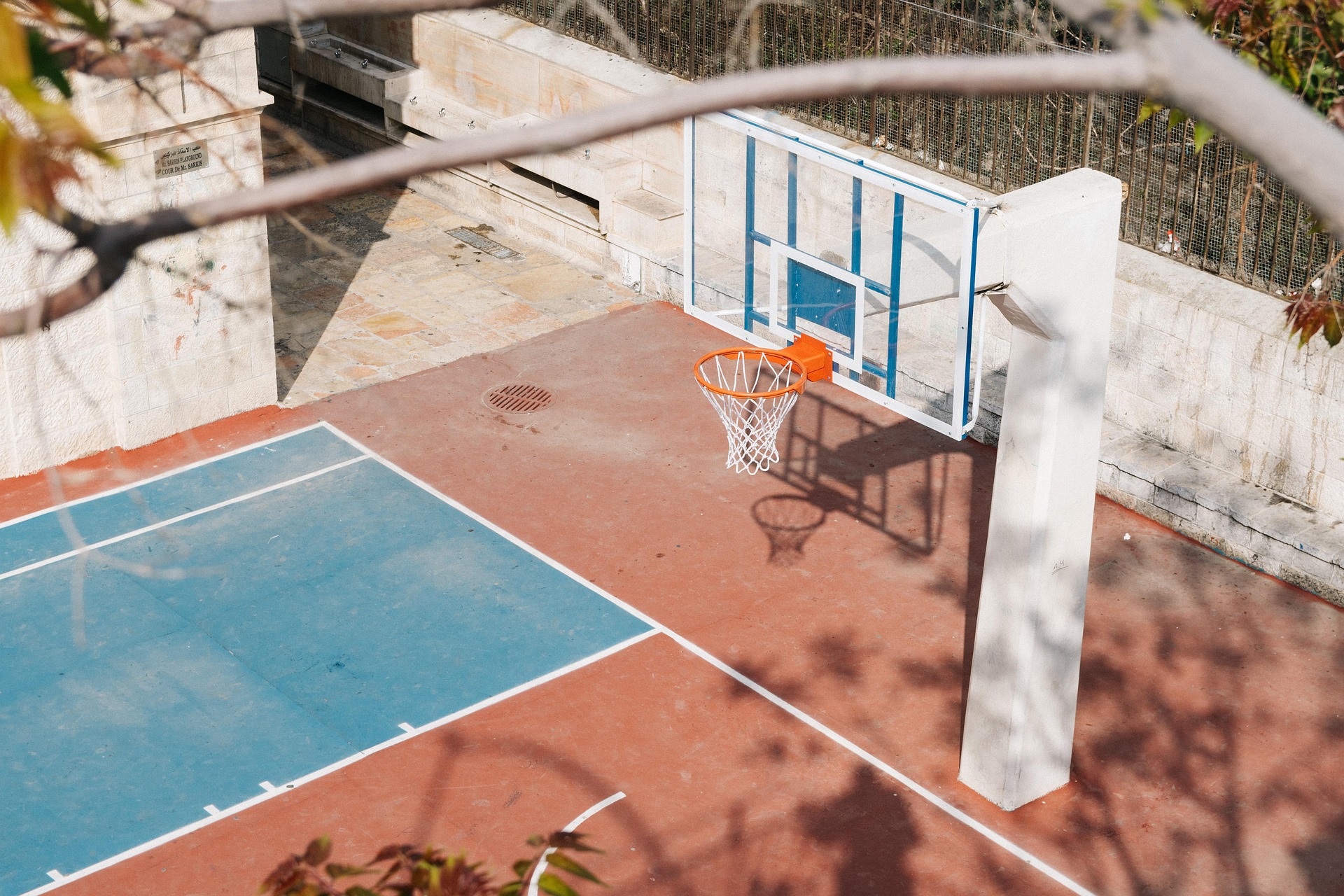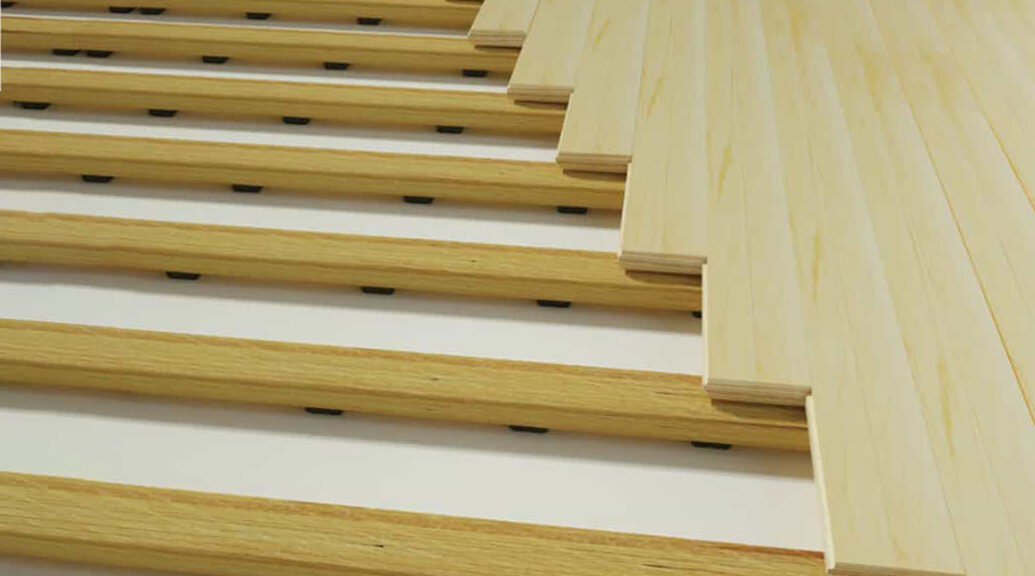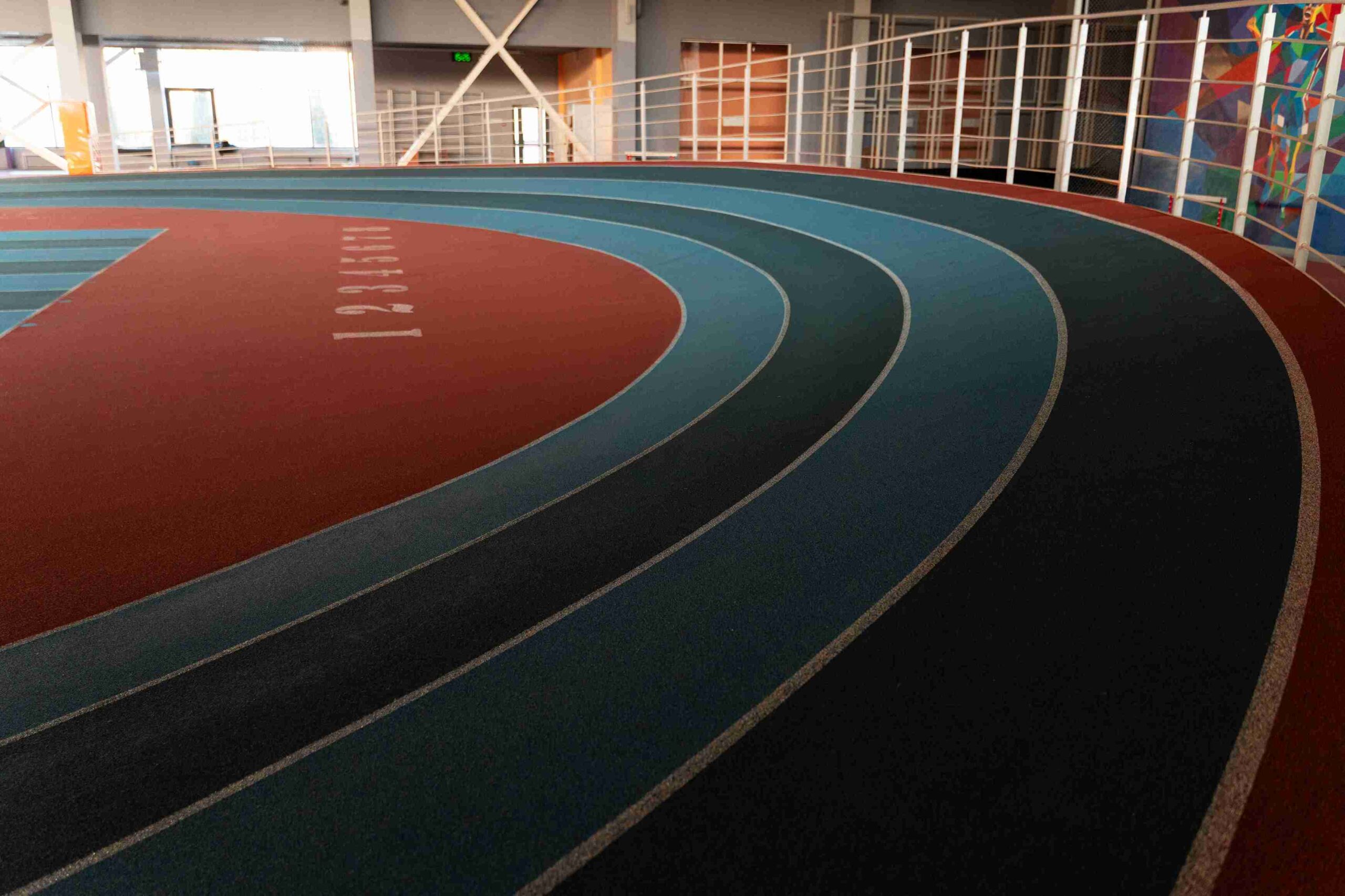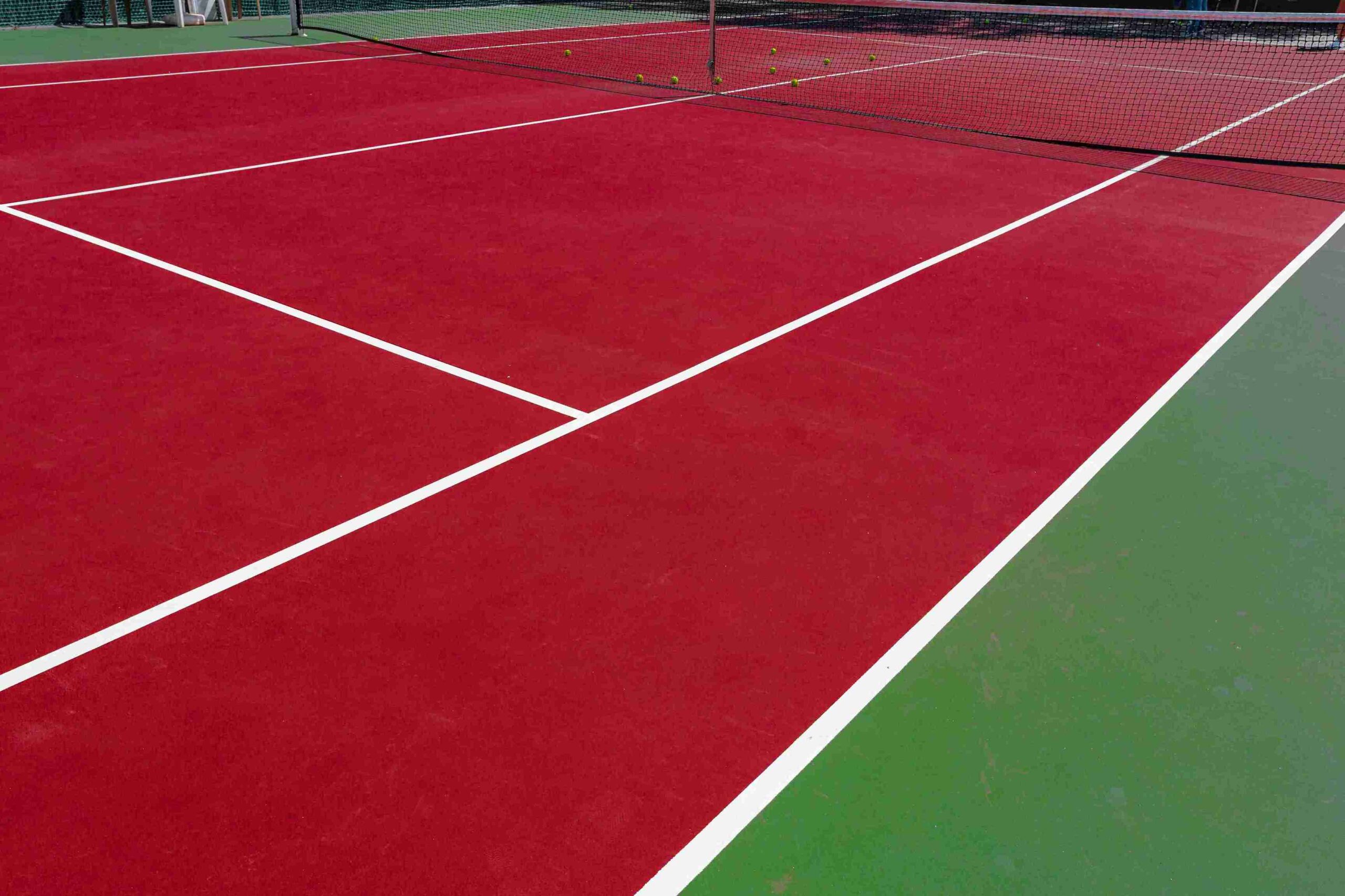Choosing the ideal basketball flooring is more than a question of aesthetics; it’s a critical investment that impacts player performance, safety, and facility maintenance. Whether setting up a professional court or an all-purpose recreational space, the flooring material you select could make or break the game.
For sports facility managers, the debate often comes down to hardwood basketball floors versus synthetic basketball floors. This blog will provide an in-depth analysis of their characteristics, performance metrics, environmental impacts, and costs, guiding you toward the most suitable choice for your facility.
Hardwood Basketball Floors: Timeless Appeal Meets Proven Functionality
Hardwood basketball floors, typically made from maple, hold a revered place in sports history. Used in iconic arenas worldwide, they offer a premium playing experience that athletes value.
Advantages of Hardwood Basketball Floors
- Classic Aesthetic Appeal
Hardwood courts exude tradition and prestige, often enhancing the reputation of a facility. The polished look reflects professionalism, and its feel underfoot is unparalleled.
- Consistent Gameplay
Hardwood surfaces are known for their dependability, offering consistent ball bounce and excellent traction critical for high-performance gameplay.
- Long-Term Durability
A well-maintained hardwood basketball floor can last over 50 years, providing an excellent return on investment for premium-grade venues.
Challenges of Hardwood Basketball Floors
- High Maintenance Requirements
Regular cleaning, sanding, resealing, and refinishing are essential to keep hardwood courts in peak condition. This process not only adds to long-term costs but also requires downtime, impacting facility usage.
- Moisture Sensitivity
Hardwood’s natural grain makes it susceptible to warping, swelling, or cracking in high-humidity environments without proper climate control.
- Significant Upfront Costs
The cost of hardwood basketball flooring usually ranges from $12 to $15 per square foot, making it a significant financial commitment upfront.
Synthetic Basketball Floors: Innovation Drives Performance
Synthetic basketball floors are increasingly favored for their affordability, ease of maintenance, and versatile applications. Designed to replicate the playability of hardwood, they add advanced features like shock absorption and stain resistance.
Advantages of Synthetic Basketball Floors
- Enhanced Durability
Synthetic surfaces resist dents, scratches, and moisture damage, making them perfect for high-traffic or multi-use facilities. They maintain their functionality even after years of constant use.
- Player Safety
Cushioned underlayers built into synthetic floors improve shock absorption, minimizing the impact on joints and reducing player fatigue or the risk of long-term injury.
- Low Maintenance Costs
Synthetic basketball floors require little more than routine cleaning, substantially reducing operational and maintenance expenditures over time.
- Sustainability
Modern synthetic floors incorporate recycled materials, promoting sustainability and reducing their environmental footprint.
Challenges of Synthetic Basketball Floors
- Limited Aesthetics
While synthetic floors perform well, they can lack the rich, timeless look of traditional hardwood, which may be a consideration for some premium venues.
- Heat Sensitivity
Extreme temperatures can damage synthetic materials, causing warping in outdoor spaces if not properly installed or treated.
Key Performance Metrics
Both hardwood and synthetic flooring options have specific characteristics that influence court performance. Below, we compare them across several vital metrics:
1. Shock Absorption
- Synthetic Floors: Engineered cushioning layers offer superior shock absorption, reducing joint stress and fatigue.
- Hardwood Floors: While durable, hardwood provides less absorbency, which could lead to repetitive strain for players over time.
2. Ball Bounce
- Hardwood Floors: Renowned for providing consistent and reliable bounce, ideal for professional-grade play.
- Synthetic Floors: Advanced materials allow synthetic options to rival hardwood’s performance, with impressive consistency in ball response.
3. Traction
- Hardwood Floors: Maintained properly, hardwood delivers excellent traction and minimizes slips.
- Synthetic Floors: Many synthetic surfaces replicate hardwood-like grip, ensuring optimal player control during games.
4. Maintenance
- Hardwood Floors: Require labor-intensive upkeep, involving frequent sanding, sealing, and refinishing.
- Synthetic Floors: Require only regular cleaning. With no sanding or refinishing needed, upkeep is minimal.
Environmental Impact of Basketball Floors
Sustainability is an important factor for sports facility managers focused on reducing their environmental footprint.
Hardwood Basketball Floors
- Renewable Resource
Maple, commonly used for hardwood courts, is a renewable material. However, its harvesting and transportation add notable carbon emissions.
- Environmental Drawbacks
Sanding and refinishing generate waste that is both labor-intensive and environmentally costly to manage.
Synthetic Basketball Floors
- Recycled Materials
Many modern synthetic floors incorporate recycled plastics, reducing overall waste.
- Reduced Resources
Minimal maintenance and a lower need for energy or water during upkeep result in a lighter environmental footprint compared to traditional hardwood.
Cost Analysis
Understanding the financial implications of each flooring type is crucial for long-term facility planning.
Hardwood Basketball Floors
- Installation Costs
Typically between $12 and $15 per square foot for high-quality materials.
- Maintenance Costs
Over a lifespan exceeding 50 years, the costs of sanding, resealing, and refinishing add up significantly.
Synthetic Basketball Floors
- Installation Costs
More affordable, averaging $5 to $8 per square foot.
- Long-Term Savings
Although synthetic floors last 20–30 years, their low maintenance and lower initial cost result in significant savings over time.
Choosing the Right Option for Your Facility
Making an informed decision between hardwood and synthetic basketball floors depends on your facility’s requirements, budget, and commitment to sustainability.
- Choose Hardwood Floors
If you manage a premium venue where aesthetics, tradition, and prestige are top priorities.
- Opt for Synthetic Floors
If you prioritize durability, cost-efficiency, and ease of maintenance in a versatile, high-traffic space.
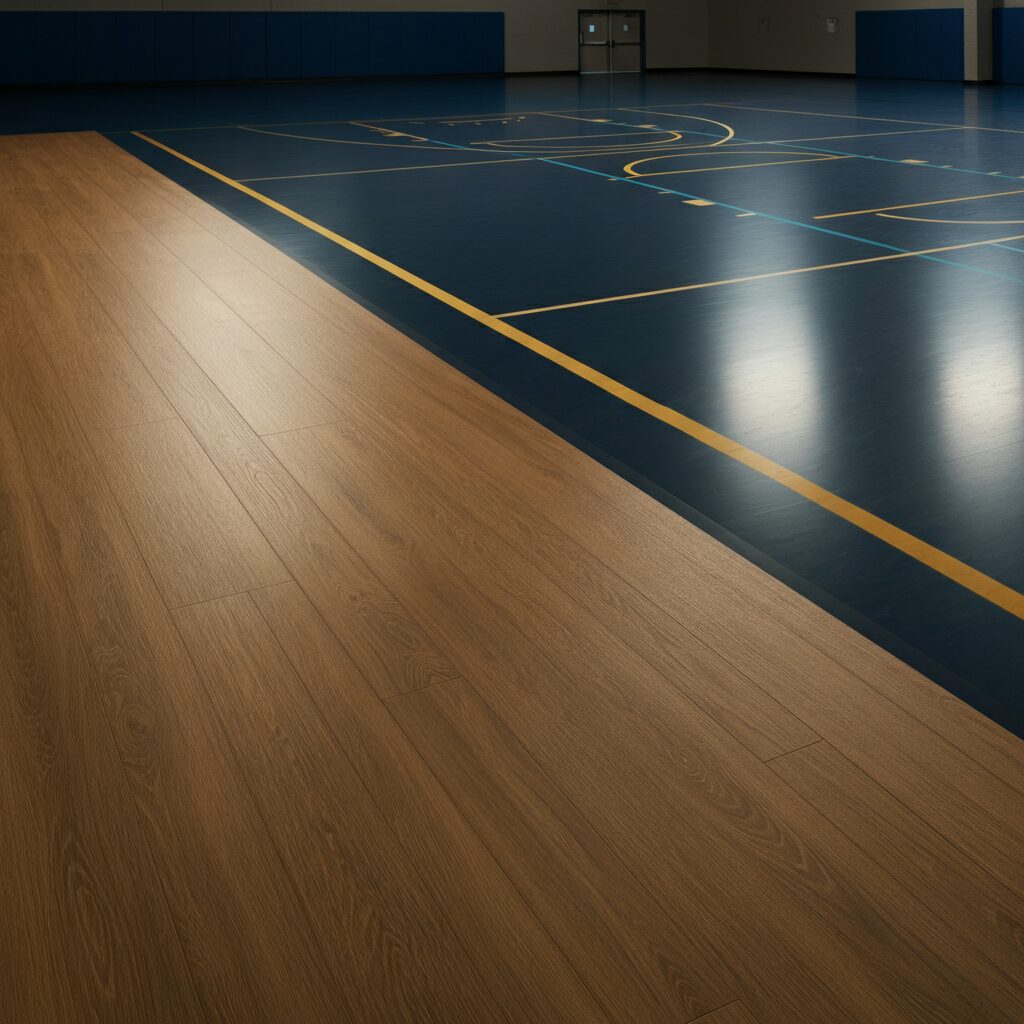

FAQs
1. How can I maintain a hardwood basketball floor?
Keep it clean, schedule professional sanding, and always manage humidity levels within your facility.
2. Are synthetic floors considered professional-grade?
Yes. With advancements in design, synthetic floors meet the standards for performance features such as ball bounce and traction.
3. What is VMKON Biomass Sport Wooden Flooring?
It’s an eco-friendly basketball floor solution combining the natural appeal of hardwood with sustainable biomass materials, offering premium aesthetics without compromising sustainability.
4. Can synthetic floors be used outdoors?
Yes, but ensure the material is UV-resistant and designed for heat resistance to withstand outdoor conditions.
5. What flooring does VMKON offer?
VMKON specializes in hardwood, synthetic, and biomass sport wooden flooring, ensuring tailored solutions for every facility.
Contact VMKON Today for Innovative Basketball Flooring
Still on the fence about which option suits your facility best? VMKON’s team of experts is here to guide you. Whether you need high-performance hardwood basketball floors, durable synthetic basketball flooring, or eco-conscious biomass sport wooden floors, we have got you covered.
Contact VMKON today to elevate your sports facility and make every game better!

